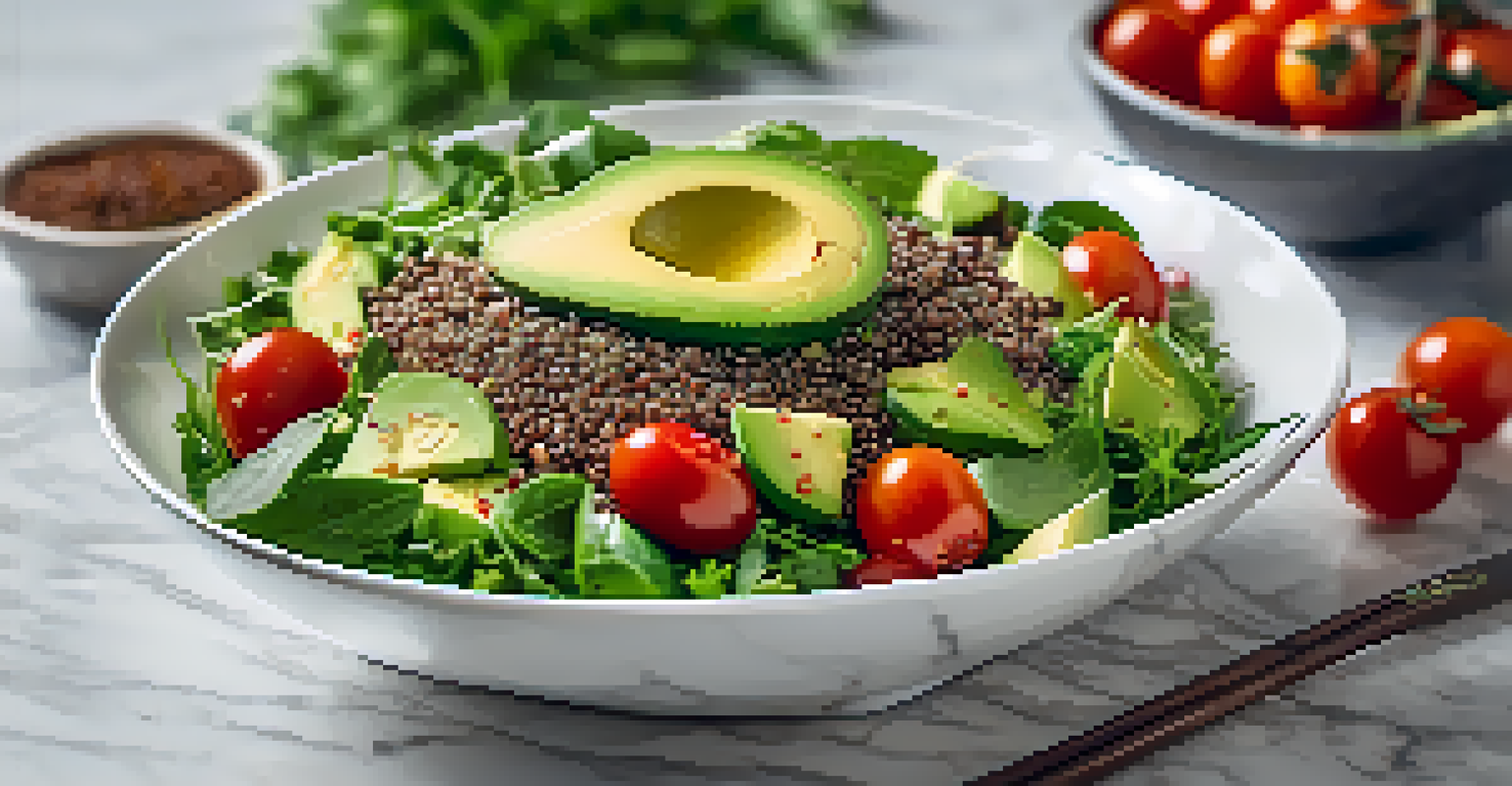Health Benefits of Veganism Compared to Vegetarianism

Understanding Veganism and Vegetarianism
Veganism and vegetarianism are both popular dietary choices, but they differ significantly. While vegetarians avoid meat, they may still consume dairy and eggs. On the other hand, vegans eliminate all animal products, including honey and dairy, leading to a more restrictive diet.
Let food be thy medicine and medicine be thy food.
These dietary choices often stem from ethical, environmental, or health considerations. For many, the decision to adopt either a vegan or vegetarian lifestyle is influenced by personal values and beliefs. Understanding these differences is crucial for evaluating their respective health benefits.
Ultimately, both diets can promote health, but they require careful planning to ensure nutritional adequacy. A well-balanced vegan diet often includes a variety of fruits, vegetables, grains, and legumes, while vegetarians might benefit from dairy and eggs. This foundational knowledge sets the stage for a deeper exploration of their health impacts.
Nutritional Profiles: Vegan vs. Vegetarian
The nutritional profiles of vegan and vegetarian diets differ due to the exclusion of animal products in veganism. Vegans may lack certain nutrients like vitamin B12, iron, and omega-3 fatty acids, which are more readily available in animal-based foods. However, with careful planning, vegans can obtain these nutrients from fortified foods and supplements.

Vegetarians, benefiting from dairy and eggs, often have an easier time meeting their nutritional needs. They can enjoy a variety of protein sources and essential vitamins without the restrictions of a vegan diet. This inclusion can also make vegetarianism a more accessible option for those concerned about nutrient intake.
Vegan vs. Vegetarian Diets Defined
Veganism eliminates all animal products, while vegetarianism allows for dairy and eggs, reflecting different dietary choices.
Both diets can be healthy when balanced properly, but individuals must be mindful of their unique nutritional requirements. Consulting with a healthcare provider or nutritionist can help tailor these diets to individual health needs. Understanding these nutritional differences is essential for making informed dietary choices.
Weight Management and Body Composition
Both vegan and vegetarian diets are often associated with lower body weight and improved body composition. Studies suggest that individuals following plant-based diets tend to consume fewer calories and have a higher intake of fiber, which promotes satiety. This can make it easier to maintain a healthy weight.
You are what you eat, so don’t be fast, cheap, easy, or fake.
However, vegan diets may offer a slight edge in weight management due to the absence of calorie-dense dairy products. By focusing on whole foods like fruits, vegetables, and whole grains, vegans often find it simpler to shed unwanted pounds. This can lead to long-term weight maintenance and better overall health.
Ultimately, weight management is influenced by lifestyle factors beyond diet alone, such as exercise and sleep. Both vegans and vegetarians can achieve their weight goals with the right approach. Finding a sustainable eating pattern that fits personal preferences is key to long-term success.
Cardiovascular Health Benefits
Heart health is a significant concern for many, and both vegan and vegetarian diets can contribute positively to cardiovascular well-being. Research indicates that plant-based diets are linked to lower cholesterol levels and reduced blood pressure. These factors are crucial in decreasing the risk of heart disease.
Vegans often have lower saturated fat intake due to the exclusion of animal products, which further supports heart health. Additionally, the high fiber content in plant-based foods can help maintain healthy cholesterol levels. This combination makes veganism an appealing option for those looking to protect their heart.
Nutritional Considerations Matter
Both diets require careful planning to ensure adequate nutrient intake, with vegans needing to focus on fortified foods for essential vitamins.
Vegetarians also enjoy cardiovascular benefits, thanks to their inclusion of heart-healthy dairy products. Incorporating low-fat dairy can provide calcium and protein without the saturated fats found in meat. Both diets showcase how a focus on whole, plant-based foods can lead to a healthier heart.
Digestive Health and Gut Microbiome
The fiber-rich nature of both vegan and vegetarian diets plays a vital role in digestive health. High fiber intake promotes regular bowel movements and supports a healthy gut microbiome. A well-functioning digestive system is essential for overall well-being and can influence various health outcomes.
Vegans, in particular, may experience enhanced gut health due to their reliance on whole grains, legumes, and fruits. These foods not only provide fiber but also serve as prebiotics, feeding beneficial gut bacteria. A diverse gut microbiome is linked to improved immunity and reduced inflammation, showcasing the benefits of a plant-based diet.
Vegetarians also benefit from dietary fiber, especially if they incorporate whole grains and plenty of fruits and vegetables. This can lead to fewer digestive issues and a more balanced gut environment. Ultimately, both diets can support digestive health when approached thoughtfully.
Potential Risks of Veganism Compared to Vegetarianism
While both diets offer significant health benefits, veganism carries certain risks that vegetarians may avoid. The absence of animal products can lead to deficiencies in critical nutrients like vitamin B12, iron, and calcium. These deficiencies can result in fatigue, weakened immunity, and other health issues if not addressed properly.
Vegetarians have an advantage in this regard, as dairy and eggs provide essential nutrients that are often lacking in a vegan diet. This inclusion can lead to a more balanced nutrient intake, reducing the likelihood of deficiencies. However, vegetarians must still be vigilant about their overall dietary choices to ensure they meet their nutritional needs.
Long-Term Health Benefits Exist
Both vegan and vegetarian diets are linked to lower risks of chronic diseases, highlighting their potential for promoting long-term health.
Understanding these risks is crucial for anyone considering a plant-based diet. Both vegans and vegetarians can thrive, but they must be proactive about their nutrition. Consulting with a healthcare professional can help mitigate potential health risks and promote a balanced approach to eating.
Long-Term Health Outcomes: Vegan vs. Vegetarian
Research indicates that both vegan and vegetarian diets can lead to improved long-term health outcomes. Studies have shown that individuals following plant-based diets tend to have a lower risk of chronic diseases such as diabetes, heart disease, and certain cancers. This underscores the potential of these diets in promoting longevity and overall health.
Vegans may experience even greater benefits due to their exclusion of animal products. Some studies suggest that a vegan diet can lead to lower rates of obesity, hypertension, and metabolic syndrome. This highlights the importance of dietary choices in shaping long-term health trajectories.

However, it's essential to remember that the benefits of these diets depend on the quality of food consumed. A diet high in processed vegan or vegetarian foods may not yield the same health benefits as one focused on whole, nutrient-dense options. Prioritizing whole foods is key to maximizing health outcomes over time.
Making the Choice: Veganism or Vegetarianism?
Choosing between veganism and vegetarianism ultimately comes down to personal preferences, health goals, and ethical considerations. Both diets offer unique health benefits, but individual needs and lifestyles play a significant role in the decision-making process. It's essential to consider what feels right for you.
If you're looking for a more restrictive diet with potentially greater health benefits, veganism may be the way to go. However, if you value the inclusion of dairy and eggs for nutritional reasons, vegetarianism could be a better fit. Understanding your motivations and health needs will guide your choice.
No matter which path you choose, focusing on whole foods and balanced nutrition is crucial. Both vegan and vegetarian diets can lead to improved health when approached mindfully. Ultimately, the best choice is the one that aligns with your values and supports your health goals.